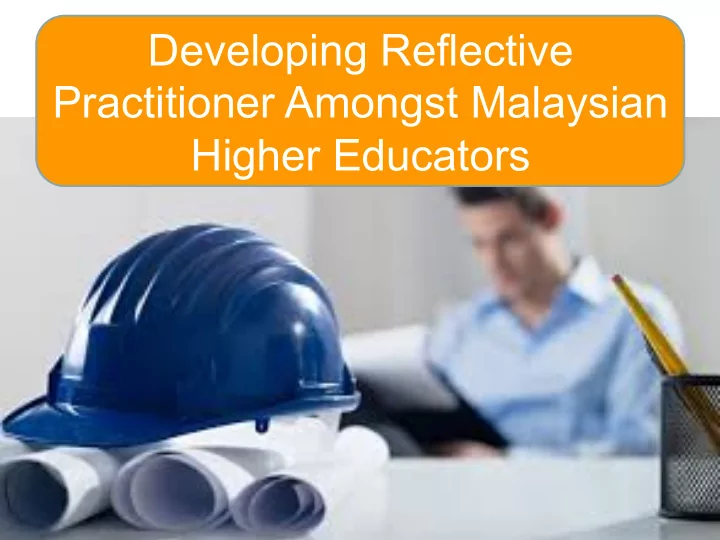

Developing Reflective Practitioner Amongst Malaysian Higher Educators 1
Who are WE? & How we were trained PhD ¡in ¡Engineering ¡– ¡Discipline ¡ Prac1ce ¡– ¡Educa1on ¡ Subject ¡– ¡Students ¡ We ¡teach ¡the ¡way ¡we ¡have ¡been ¡thought ¡ Learn ¡on ¡the ¡job ¡ 2
Teaching Inquiry Technical ¡-‑ ¡Numerical ¡analysis, ¡founda5on, ¡ structural ¡failure ¡etc ¡ Non-‑technical ¡– ¡Comm. ¡Skill, ¡English, ¡NLP, ¡ Mekanik Tanah I 35 31 conflict ¡management, ¡coaching ¡& ¡ 30 25 Bil. Calon 20 counseling ¡etc ¡ 15 15 14 12 10 10 9 9 5 5 3 3 0 0 0 A A- B+ B B- C+ C C- D+ D F FF -5 Grade Self reflection Training Implementation Analysis Research & Exposure 3
Teaching Inquiry 4
Where are we NOW 5
What is SoTL 6
Driving SoTL at National Level ¡ PSPTN ¡2020 ¡– ¡Improving ¡quality ¡of ¡ teaching ¡and ¡learning ¡ 15 ¡Modules ¡to ¡support ¡lecturers ¡in ¡ enhancing ¡TnL ¡ ¡ 7
SoTL ToT Module 8
AKEPT and SoTL Training Trained ¡7 ¡cohorts, ¡more ¡than ¡130 ¡lecturers ¡ since ¡2013. ¡ How ¡do ¡we ¡DIFFER ¡from ¡other ¡modules ¡ ¡ 9
Transform with SoTL 10
What is Reflective Practice Reflective practice is the process of internally examining and exploring an issue of concern, triggered by an experience, which results in a change of perspective’ (Boyd and Fales, 1983, in Bolton 2005) 11
Critical Incident No ¡incidents ¡ Nothing ¡is ¡wrong ¡ with ¡me ¡and ¡my ¡ teaching ¡ Trust Me, I have more than 20 years of teaching experience
Critical Incident Teaching ¡is ¡familiar ¡to ¡us ¡ To ¡examine ¡our ¡prac1ce ¡is ¡to ¡make ¡the ¡ familiar ¡unfamiliar ¡so ¡that ¡we ¡can ¡inquire ¡ To ¡advance ¡our ¡growth ¡as ¡scholar-‑teacher ¡ 13 Thus ¡enhancing ¡learning ¡
Critical Incident Reflective practice is more than an examination of personal experience; it is located in the political and social structures which are increasingly hemming professionals in (Goodson 2004, in Bolton, 2005, p.5)
Tools to Reflect Brookfield (1995) model involves looking at your practice through four points of view or ‘critical lenses’ 1. the point of view of the teacher 2. the point of view of our learners 3. the point of view of our colleagues 4. the point of view of theories and literature
Tools to Reflect • David A. Kolb experiential learning Active Concrete cycle also used to Experimentation Experience explain reflective Plan DO practice. • The reflective cycle can begin at any one of the four points. Smith, Mark (1996, last updated Abstract Reflective 2006) David a. Kolb on Experiential Learning ,< Conceptualisation Observation http://www.infed.org/biblio/b- Read Reflect explrn.htm#links > [date accessed 3/10/07]
What is Reflective Practice O’Connor and Diggins define Reflective Practice as thinking about what educators do in order to reconsider their actions and refine their practices according to these thoughts. Reflective Practice is a cycle of on-going learning that occurs when we take the time to ‘stop, think and change. (O’Connor and Diggins, 2002, p.9) 17
Thinking process Time Sytematic Captuture
Levels of Reflective Practice Common sense reflecting Reflective practice Professional reflective practice (Level 3) (Level 1) (Level 2) No consideration of The use of a model or The use of a model or organisation process to record process to record reflections reflections Usually not recorded May be recorded It is recorded formally formally A solitary process. not Generally a solitary A shared process intended to be read by others process but ideas may therefore it will be be shared with others shared with others Adapted from Roffey-Barentsen and Malthouse, 2009, p.10
Action Research Systematic Inquiry into one’s own practice (Johnson, 2008) Inquiry about -how we teach, how students learn (Mills, 2007) Research done by teachers for themselves To improve Quality and Effectiveness of Teachers Hence Student Learning Outcome Systema1c ¡Enquiry ¡Made ¡Public ¡(Lawrence ¡Stenhouse) ¡ ¡
Project-based ¡ ¡ ¡UMAR ¡versus ¡ AKEPT ¡ compact ¡ version ¡
SoTL Reasearch and Community of Practice 23
Barriers and Challenges National Level Selection of participant Coordination and integration with other module? Funding and platform for full-version module ¡ ¡ ¡
Barriers and Challenges University Setting Work load - Our preparation – lecturer – TnL Faculty support – effort to alter teaching practices – technology? Less work load releasefor PBL practitioner? Difficulty in giving up personal beliefs, opinions, and traditions in teaching ¡ ¡ ¡ Resources – time and financial Recognition – award reward system - champion
Barriers and Challenges Individual Lecturer • The knowledge and support • The time to reflect • To be honost and challenge personal believe • Fear of living in own proven living theories • Fear of peer critical review ¡ ¡ ¡
Recommend
More recommend